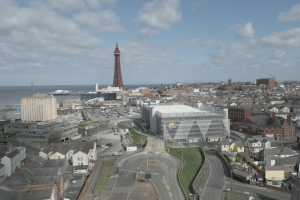Private investment to drive Liverpool’s development plans

LIVERPOOL is planning to fund its ambitious 15-year development plan by pooling public funding into a single pot that will then attract private investment.
Yesterday the city published its strategic investment framework (SIF) – a blueprint for future developments in the city.
Priorities include improving the waterfront and making the area around St George’s Hall into the city’s Trafalgar Square. This would involve pulling down the Churchill flyover.
There are also plans to revamp the city’s “Great Streets” – The Strand, Hope Street, and the corridor from Lime Street to Water Street along Dale Street – and continue to develop the Knowledge Quarter around the universities.
The report is a vision of how the city wants to progress and there is little detail on how the various ideas will be delivered. But the small print reveals an intention to use public cash to attract large amounts of private investment.
The last such report, published in 2000, set out schemes such as Liverpool One and the Arena and Convention Centre. But this was at a time of economic growth and central government largesse.
The SIF states: “The city is in the process of bringing together a wide range of funding streams and assets and matching these with private sector funding to create a ‘single pot’ that will provide the Liverpool Mayoral Development Corporation with the ability to respond flexibly and quickly to capture economic opportunities.
“The details will evolve over time but the intention is to pool public funding streams into a single investment pot. This will encompass income from the business rate uplift in the Enterprise Zones (Liverpool city and Liverpool Waters) and public assets including the co-ordination and disposal of Homes and Communities (HCA) assets through a joint agreement.
“This single pot will be used to attract private sector match funding, sector loans and equity. Additional private investment could significantly increase the size of the investment pot. This could come from: private sector match funding for public funding; private sector leverage – for every £1 of public money in the single pot we would aim to secure a minimum of £1 private sector funding; and equity leverage – the investment programme will use equity leverage mechanisms as well as traditional borrowings and grants.”
The report – developed by economic development company Liverpool Vision and a team of regeneration experts led by Drivers Jonas Deloitte – must now be considered by the city council and mayor’s development board. Projects will then be prioritised for implementation.








